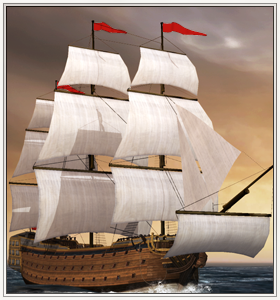Difference between revisions of "Admiral's Flagship, 1st Rate (ETW Unit)"
Shackleton (talk | contribs) |
Shackleton (talk | contribs) |
||
| Line 13: | Line 13: | ||
[[Image:1st_rate_thumbnail.png]]The first rate is the largest type of “ship of the line of battle”, intended to be the command ships at the centre of any fleet. | [[Image:1st_rate_thumbnail.png]]The first rate is the largest type of “ship of the line of battle”, intended to be the command ships at the centre of any fleet. | ||
==Overview== | ==Overview== | ||
| − | While these warships are among the most powerful vessels afloat, they are poor sailors, being both slow and unresponsive. This is not a serious shortcoming because, armed with around 100 cannons firing 32 | + | While these warships are among the most powerful vessels afloat, they are poor sailors, being both slow and unresponsive. This is not a serious shortcoming because, armed with around 100 cannons firing 32, 24 and 18-pounder balls on their three decks, they can fire a terrible and destructive broadside. They carry a crew of over 800 sailors, gunners and marines and have more artillery than most land armies. Their cost, however, is a drawback and few navies can afford to build or maintain more than a handful of them. Their great size, however, means that an admiral and his staff can be carried with little disruption to the normal working of the ship. |
One first rate flagship never even reached the sea! The British Royal Navy’s HMS St Lawrence was built, launched and served only on Lake Ontario. Shallow rapids meant that few vessels could reach the lake from the sea, and Niagara Falls prevented any ship from leaving the lake in the other direction. | One first rate flagship never even reached the sea! The British Royal Navy’s HMS St Lawrence was built, launched and served only on Lake Ontario. Shallow rapids meant that few vessels could reach the lake from the sea, and Niagara Falls prevented any ship from leaving the lake in the other direction. | ||
Revision as of 15:24, 6 January 2013
 The first rate is the largest type of “ship of the line of battle”, intended to be the command ships at the centre of any fleet.
The first rate is the largest type of “ship of the line of battle”, intended to be the command ships at the centre of any fleet.
Overview
While these warships are among the most powerful vessels afloat, they are poor sailors, being both slow and unresponsive. This is not a serious shortcoming because, armed with around 100 cannons firing 32, 24 and 18-pounder balls on their three decks, they can fire a terrible and destructive broadside. They carry a crew of over 800 sailors, gunners and marines and have more artillery than most land armies. Their cost, however, is a drawback and few navies can afford to build or maintain more than a handful of them. Their great size, however, means that an admiral and his staff can be carried with little disruption to the normal working of the ship.
One first rate flagship never even reached the sea! The British Royal Navy’s HMS St Lawrence was built, launched and served only on Lake Ontario. Shallow rapids meant that few vessels could reach the lake from the sea, and Niagara Falls prevented any ship from leaving the lake in the other direction.
Details
Though very expensive, these ships are the equal or superior in terms of firepower and morale to almost every other warship in the game (with the exception of the Heavy First Rate. The dedicated flagships are no exception to this, boasting higher morale and hull strength. Certainly, if the opposing fleet is made up of vessels smaller than this one, it is unlikely that the battle will take very long. As with any ship of the line however these ships are best used in groups, or at the very least with the support of other vessels of their class. A 1st Rate caught on its own and surrounded, even if it is only surrounded by smaller vessels, will find it very difficult indeed to break out and win the day.
Factions
 Great Britain
Great Britain United Provinces
United Provinces Afghanistan
Afghanistan Austria
Austria Barbary States
Barbary States Bavaria
Bavaria Dagestan
Dagestan Gran Colombia
Gran Colombia Courland
Courland Denmark
Denmark France
France Genoa
Genoa Georgia
Georgia Greece
Greece Hannover
Hannover Hessen
Hessen Hungary
Hungary Ireland
Ireland Knights of St. John
Knights of St. John Louisiana
Louisiana Mamelukes
Mamelukes Maratha Confederacy
Maratha Confederacy Mexico
Mexico Morocco
Morocco Mughal Empire
Mughal Empire Mysore
Mysore Naples & Sicily
Naples & Sicily New Spain
New Spain Norway
Norway Ottoman Empire
Ottoman Empire Italian States
Italian States Savoy
Savoy Poland-Lithuania
Poland-Lithuania Portugal
Portugal Prussia
Prussia Punjab
Punjab Quebec
Quebec Russia
Russia Persia
Persia Saxony
Saxony Scotland
Scotland Spain
Spain Sweden
Sweden Thirteen Colonies
Thirteen Colonies United States
United States Venice
Venice Westphalia
Westphalia Württemberg
Württemberg
